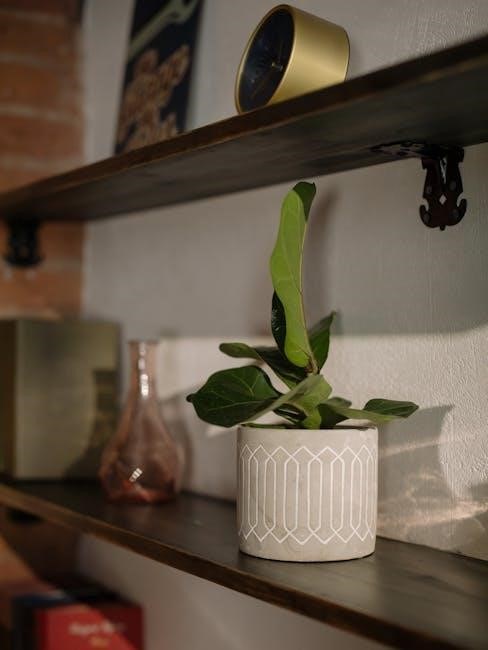
how to keep a house while drowning pdf
This guide by KC Davis offers a compassionate approach to home care, addressing emotional and practical challenges. It provides daily reflections and strategies for managing stress and anxiety, helping individuals create a sustainable routine that prioritizes well-being over perfection. The book is particularly suited for those struggling with ADHD, depression, or postpartum challenges, offering a gentle and understanding path to maintaining a home.
1.1 Overview of the Book
How to Keep a House While Drowning by KC Davis is a compassionate guide for individuals struggling with home maintenance. It addresses emotional and practical challenges, offering six life-changing principles and 31 daily reflections. The book targets those with ADHD, depression, or postpartum struggles, providing strategies to alleviate shame and anxiety. Davis emphasizes self-compassion and realistic routines, helping readers create a balanced approach to cleaning and organizing without perfectionism. It’s a unique, gentle alternative to traditional cleaning guides, focusing on emotional well-being and sustainable habits.
1.2 Target Audience and Purpose
The book is designed for individuals struggling with home maintenance due to mental health challenges, ADHD, or chronic stress. It aims to alleviate the emotional burden of housekeeping by offering practical strategies and daily reflections. KC Davis addresses those who feel overwhelmed, providing tools to reduce shame and anxiety. The purpose is to empower readers to create a manageable routine that fosters self-compassion and balance, helping them thrive despite life’s challenges.
Understanding the Challenges of Maintaining a Home
Maintaining a home can feel overwhelming, especially when dealing with mental health struggles. The emotional weight of cleaning and organizing often exacerbates stress and anxiety.
2.1 Common Struggles with Cleaning and Organizing
Cleaning and organizing can feel insurmountable, especially when overwhelmed by mental health challenges. Many struggle with procrastination, lack of motivation, and the emotional weight of clutter. The book acknowledges these struggles, offering a compassionate perspective on why maintaining a home can feel so daunting. It addresses the cycle of shame and anxiety that often accompanies disorganization, providing gentle strategies to break free from these patterns and foster a more manageable approach to housekeeping.
2.2 The Emotional Toll of Household Responsibilities
Household responsibilities often extend beyond physical tasks, carrying emotional weight that can lead to feelings of overwhelm and burnout. Shame and anxiety about an untidy home can intensify mental health struggles, creating a cycle of self-criticism. KC Davis acknowledges these emotional challenges, emphasizing how societal expectations and personal pressures exacerbate the burden. The book addresses the emotional toll of disorganization, offering compassion and understanding to help readers break free from guilt and embrace a more self-compassionate approach to housekeeping.
Key Principles from the Book
The book introduces six life-changing principles to transform home care, emphasizing self-compassion and realistic expectations. These principles help readers overwhelmed by household tasks to embrace a more balanced, guilt-free approach.
3.1 The Six Life-Changing Principles
The six principles include embracing imperfection, focusing on progress over perfection, and prioritizing self-care. They encourage setting realistic expectations, breaking tasks into manageable steps, and practicing self-compassion. These principles aim to redefine cleaning and organizing as acts of self-love, helping readers shift from shame to empowerment. By integrating these principles, individuals can create a sustainable home care routine that aligns with their well-being and personal goals, fostering a healthier relationship with their living space and themselves.
3.2 The Importance of Self-Compassion in Housekeeping
Self-compassion is central to KC Davis’s approach, emphasizing kindness over criticism. It helps individuals acknowledge their struggles without shame, fostering resilience. By practicing self-compassion, readers learn to view housekeeping as a form of self-care, reducing anxiety and guilt. This mindset encourages a healthier relationship with home maintenance, allowing for gradual, guilt-free progress and emotional well-being.

Daily Reflections and Practical Exercises
The book provides 31 daily reflections to help readers alleviate shame and anxiety, paired with practical exercises to improve cleaning and organizing skills gradually and sustainably.
4.1 The Role of 31 Daily Reflections
The 31 daily reflections in “How to Keep House While Drowning” are designed to help readers gradually shift their mindset. Each reflection addresses feelings of guilt and overwhelm, offering a compassionate perspective. By focusing on emotional well-being, these reflections create a foundation for sustainable change. They encourage self-kindness and realistic expectations, helping readers build confidence and clarity in their cleaning routines. This approach fosters resilience and reduces the pressure to achieve perfection.
4.2 Exercises for Improving Cleaning and Organizing Skills
The book provides practical exercises to enhance cleaning and organizing abilities. These tasks are designed to be manageable, helping readers build skills gradually. Strategies include breaking chores into smaller steps, using timers to limit overwhelm, and creating adaptable routines. The exercises emphasize progress over perfection, encouraging readers to celebrate small victories. They also include tips for decluttering and maintaining spaces, making the process feel achievable and sustainable. These exercises foster confidence and long-term habits.

Overcoming Emotional and Mental Barriers
The book helps readers tackle emotional hurdles like shame and anxiety, providing strategies to reframe negative thoughts and foster self-compassion. It emphasizes creating a supportive environment for sustainable change.
5.1 Addressing Shame and Anxiety Related to Housekeeping
The book tackles the emotional weight of housekeeping by addressing shame and anxiety. KC Davis offers a compassionate approach, helping readers reframe negative thoughts and cultivate self-compassion. Strategies include challenging harsh self-criticism, setting realistic expectations, and embracing imperfection. By normalizing struggles, the guide encourages readers to view housekeeping as a process rather than a source of guilt, fostering a healthier relationship with their living spaces and themselves.
5.2 Strategies for Managing Procrastination and Avoidance
Addressing procrastination and avoidance, the book offers practical strategies to break cycles of delay. KC Davis emphasizes small, manageable steps to reduce overwhelm. Techniques include breaking tasks into micro-steps, setting gentle deadlines, and practicing self-compassion. The guide encourages readers to reframe their mindset, viewing progress as more important than perfection. These strategies help individuals move past paralysis, fostering a more balanced and sustainable approach to household responsibilities without the weight of guilt or avoidance.
Creating a Realistic Routine
This section offers practical advice for establishing a gentle, sustainable routine. It focuses on time management tips and balancing chores with personal well-being to avoid burnout;
6.1 Time Management Tips for Busy Individuals
- The book provides practical strategies for managing time effectively, even for those overwhelmed by daily tasks.
- It emphasizes prioritizing essential chores and breaking them into smaller, manageable steps.
- Creating a flexible schedule and setting realistic expectations are key.
- Learn to delegate tasks and embrace imperfection to reduce stress.
- These tips help balance productivity with self-care, ensuring long-term sustainability.
6.2 Balancing Chores with Personal Well-Being
The book stresses the importance of balancing household tasks with mental and physical health. It encourages setting boundaries and prioritizing self-care to avoid burnout. By integrating small, manageable chores into daily routines, individuals can maintain their well-being while keeping their homes orderly. The guide also emphasizes the value of rest and leisure, ensuring that personal needs are met alongside responsibilities. This approach fosters a healthier relationship between productivity and self-care.
The Author’s Approach and Expertise
KC Davis, a licensed therapist, offers a compassionate approach to housekeeping, focusing on mental health and self-care. Her expertise provides practical strategies for overwhelmed individuals.
7.1 KC Davis’s Background and Philosophy
KC Davis, a licensed therapist, brings a unique perspective to housekeeping, blending mental health expertise with practical advice. Her philosophy emphasizes self-compassion, challenging perfectionism, and prioritizing well-being over a flawless home. Davis’s approach is rooted in understanding the emotional barriers to cleaning and organizing, offering strategies that foster sustainability and balance. Her background in therapy equips her to address the deeper issues behind clutter and disorganization, making her a trusted guide for overwhelmed individuals seeking a healthier relationship with their living spaces.
7.2 How the Book Differs from Traditional Cleaning Guides
KC Davis’s approach in How to Keep House While Drowning diverges from traditional cleaning guides by focusing on emotional and mental barriers rather than just physical tasks. Unlike typical cleaning books, it addresses shame, anxiety, and burnout, offering a compassionate, non-judgmental perspective. The guide emphasizes self-care and sustainability, providing practical yet gentle strategies tailored for those overwhelmed by household responsibilities. It prioritizes mental well-being over perfection, making it a unique resource for individuals struggling with ADHD, depression, or postpartum challenges.

Community and Support Systems
The book emphasizes the importance of family, friends, and online communities in maintaining a home. Sharing responsibilities and connecting with others can alleviate the burden of household tasks.
8.1 The Role of Family and Friends in Maintaining a Home
Family and friends play a vital role in sharing household responsibilities, reducing stress, and preventing burnout. KC Davis highlights the importance of delegating tasks and seeking support from loved ones. This not only lightens the workload but also fosters a sense of teamwork and connection. Encouraging open communication about needs and expectations can create a more balanced and sustainable home environment for everyone involved.
8.2 Online Communities for Shared Support
Online communities offer invaluable support for individuals struggling to maintain their homes. These platforms provide a space to share experiences, receive encouragement, and learn practical strategies. KC Davis emphasizes the importance of connection, as seen in forums and social media groups dedicated to home care. Sharing challenges and successes with others fosters accountability and reduces feelings of isolation. These communities become a lifeline, offering emotional support and actionable advice to help individuals stay on track with their goals.
Embracing self-compassion and realistic routines transforms home care into a manageable, guilt-free process. This guide encourages long-term success by prioritizing well-being and fostering a balanced, sustainable lifestyle.
9.1 Summarizing the Key Takeaways
KC Davis’s guide emphasizes self-compassion and realistic expectations in home care. It introduces six life-changing principles, 31 daily reflections, and practical exercises to alleviate shame and anxiety. By addressing emotional barriers and fostering sustainable routines, the book helps readers balance chores with personal well-being. It encourages a gentle, non-judgmental approach, making it accessible for those overwhelmed by household responsibilities. The key takeaway is that maintaining a home is about progress, not perfection, and self-care is essential to long-term success.
9.2 Encouragement for Long-Term Success
The book inspires readers to embrace patience and self-kindness, celebrating small victories along the way. It encourages a mindset shift from perfectionism to progress, emphasizing that home care is a journey, not a destination. By fostering a supportive environment and adapting routines to personal needs, individuals can sustain their efforts over time. The key is to prioritize self-care and recognize that maintaining a home is an act of love and self-compassion.